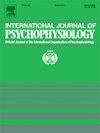在 "尽力而为 "的任务中,个人选择可以抵御情绪对努力程度的影响:对心脏反应的影响
IF 2.5
3区 心理学
Q3 NEUROSCIENCES
引用次数: 0
摘要
本实验(N = 113)测试了在 "尽力而为 "的任务情境中,个人选择与任务特征的外部分配是否会调节偶然情感刺激对与努力相关的心血管反应的影响。当受试者可以自己选择记忆测试中使用的刺激物(即一系列需要记忆的字母)的颜色时,我们预计受试者会有较高的任务承诺和调动资源的意愿,较强的行动屏蔽,因此对偶然情感影响的接受度较低。相比之下,当颜色由外部指定时,我们预期调动资源的意愿低,行动屏蔽弱,因此对努力的情感影响强。正如我们所预测的那样,在指定颜色条件下,参与者在执行任务期间受到悲伤音乐的影响比受到快乐音乐的影响时表现出更强的心脏射血前反应。这些音乐效应并没有出现在可以亲自选择颜色的参与者身上。在这种情况下,无论背景音乐是快乐还是悲伤,努力程度都很高。本研究表明,在一项难度不固定的任务中,个人选择对资源调动具有调节作用,而快乐和悲伤的背景音乐则是附带的情感影响因素。本文章由计算机程序翻译,如有差异,请以英文原文为准。
Personal choice shields against affective influences on effort in a “do your best” task: Effects on cardiac response
This experiment (N = 113) tested whether personal choice vs. external assignment of task characteristics moderates the effect of incidental affective stimulation on effort-related cardiovascular response in a “do your best” task context. When participants could choose themselves the color of the stimuli (i.e., a series of letters to be recalled) used in a memory task, we expected high task commitment and willingness to mobilize resources, strong action shielding, and thus low receptivity for incidental affective influences. By contrast, when the color was externally assigned, we expected low willingness to mobilize resources, weak action shielding, and thus strong affective influences on effort. As predicted, participants in the assigned color condition showed stronger cardiac pre-ejection period reactivity during task execution when exposed to sad music than when exposed to happy music. These music effects did not appear among participants who could personally choose the color. Here, effort was high independently of the happy or sad background music. The present study demonstrates the moderating effect of personal choice on resource mobilization in a task of unfixed difficulty with happy and sad background music as incidental affective influence.
求助全文
通过发布文献求助,成功后即可免费获取论文全文。
去求助
来源期刊
CiteScore
5.40
自引率
10.00%
发文量
177
审稿时长
3-8 weeks
期刊介绍:
The International Journal of Psychophysiology is the official journal of the International Organization of Psychophysiology, and provides a respected forum for the publication of high quality original contributions on all aspects of psychophysiology. The journal is interdisciplinary and aims to integrate the neurosciences and behavioral sciences. Empirical, theoretical, and review articles are encouraged in the following areas:
• Cerebral psychophysiology: including functional brain mapping and neuroimaging with Event-Related Potentials (ERPs), Positron Emission Tomography (PET), Functional Magnetic Resonance Imaging (fMRI) and Electroencephalographic studies.
• Autonomic functions: including bilateral electrodermal activity, pupillometry and blood volume changes.
• Cardiovascular Psychophysiology:including studies of blood pressure, cardiac functioning and respiration.
• Somatic psychophysiology: including muscle activity, eye movements and eye blinks.

 求助内容:
求助内容: 应助结果提醒方式:
应助结果提醒方式:


